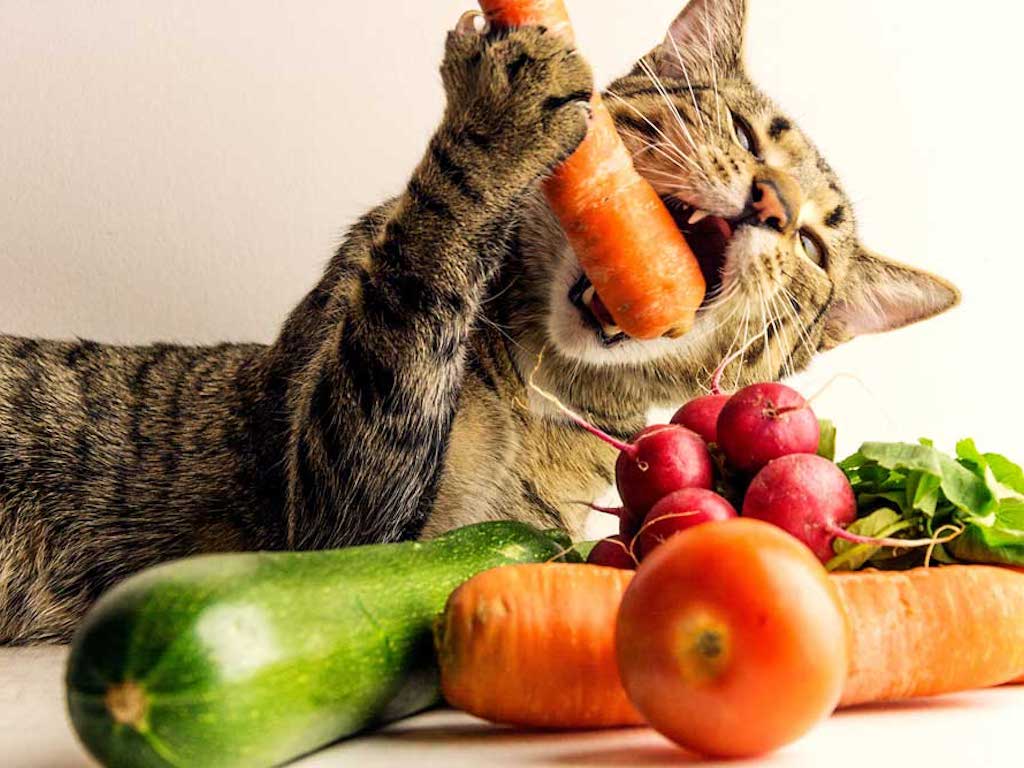3 Mins Read
A new study suggests that contrary to popular belief, cats fed plant-based diets that are nutritionally sound do not appear to be adversely affected at all. In fact, researchers found that cats who were on vegan diets had more ideal body condition scores than their meat-eating counterparts. While the paper acknowledges that further observational studies should be considered to come to a conclusion, the study is among the first to document the health and wellness of cats who appear able to thrive on a meat-free diet.
Conducted by researchers at the Ontario Veterinary College of the University of Guelph in Canada, the new study, published in peer-reviewed journal BMC Veterinary Research, suggests that cats could live healthy full lives on a plant-based diet. Involving more than 1,320 cat owner questionnaires, of which 20% fed their cats an entirely vegan diet, the study found that cats who were on meatless diets had on average better body condition scores and were less likely to suffer from adverse illnesses such as gastrointestinal and hepatic disease.
Cats who participated in the study included kittens at just 4 months of age, to elderly cats up to 23 years old. While no differences in lifespan were detected between carnivorous and herbivorous cats, it was more likely for cat owners of the latter to report their cats to be in very good health.
Cat owner perception of the health and wellness of cats does not appear to be adversely affected by being fed a plant-based diet. Contrary to expectations, owners perceived no body system or disorder to be at particular risk when feeding a plant-based diet to cats.
Dodd, Dewey, Khosa et al. A cross-sectional study of owner-reported health in Canadian and American cats fed meat- and plant-based diets. (2021)
Read: Q&A with vegan veterinarian Dr. Tiger on why we “need more ethics in this world”
The findings appear to contradict the prevailing belief that because cats, being obligate carnivores, require animal-based ingredients in their diets and that going without would cause nutritional deficiencies, imbalances and negative health outcomes.
“A small proportion of cat owners feed strictly plant-based diets to the cats in their care, yet the health and wellness of cats fed these diets has not been well documented,” wrote the authors of the study.
“Cat owner perception of the health and wellness of cats does not appear to be adversely affected by being fed a plant-based diet. Contrary to expectations, owners perceived no body system or disorder to be at particular risk when feeding a plant-based diet to cats.”
While the researchers noted that the study, being based on responses and observations from cat owners, is subject to potential bias and methodological limitations, they say that it sheds light on the ability of plant-based cats to thrive and counters common expectations about the adverse impact that non-animal-based diets can have on cats. Further research would help to determine whether the same results can be achieved in clinical settings.
This recent study is limited by its reliance on owner opinions, but it is nevertheless a very large-scale study and makes an important contribution to this field.
Professor Andrew Knight, European & RCVS Veterinary Specialist
Read: This startup is making animal-free food for your cats and dogs
Commenting on the findings in an interview with Vet Times, Professor Andrew Knight, a European and Royal College of Veterinary Surgeons (RCVS) specialist in animal welfare science, ethics and law, said: “The veterinary profession has generally held the view that cats in particular cannot thrive on a vegan diet. Many worry about feline inability to adequately digest plant-based ingredients, or similar factors.”
“However, evidence to support such concerns is lacking. In any case, the gold standard is always the effects on the animal itself. This recent study is limited by its reliance on owner opinions, but it is nevertheless a very large-scale study and makes an important contribution to this field.”
Lead image courtesy of iStock.




